Fabio Morábito: El lector a domicilio
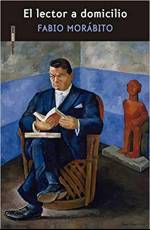 Eduardo, the protagonist of this novel, has committed a minor crime for which he has been sentenced to a year of community service, which includes reading novels at a home for the sick or retirees. Despite his attractive masculine voice, he is unable to engage in the books he reads or even to grasp the meaning of the words that cross his eyes. His listeners blame him. The friendly home visits turn into conflicting situations that will force Eduardo to question himself as an individual. Trapped between the provincial boredom of a town in eternal springtime and the danger of prevailing criminality, he will allow himself to be dragged into a series of sinister events in a totally unforeseen way. These events will place him at the heart of the senior population, to whom he has suddenly been forced to dedicate a significant part of his life.
Eduardo, the protagonist of this novel, has committed a minor crime for which he has been sentenced to a year of community service, which includes reading novels at a home for the sick or retirees. Despite his attractive masculine voice, he is unable to engage in the books he reads or even to grasp the meaning of the words that cross his eyes. His listeners blame him. The friendly home visits turn into conflicting situations that will force Eduardo to question himself as an individual. Trapped between the provincial boredom of a town in eternal springtime and the danger of prevailing criminality, he will allow himself to be dragged into a series of sinister events in a totally unforeseen way. These events will place him at the heart of the senior population, to whom he has suddenly been forced to dedicate a significant part of his life.
With the vivid style of his stories, Fabio Morábito offers us an original and dizzying novel where a sick father, a mysterious female poet, a family of deaf people, and a home reader’s destinies intersect in a place that holds a suspicious record as the city with the most pools in the world.
Fernanda Melchor: Páradais
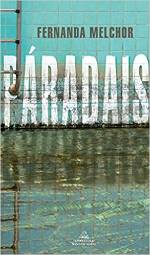 “Fernanda Melchor explores violence and inequality with brutality in this novel. She renders the story with dazzling, skillful techniques, listening absolutely for orality and with a neurosurgeon’s precision for cruelty. Páradais is a brief and exorable descent into hell.” – Mariana Enriquez
“Fernanda Melchor explores violence and inequality with brutality in this novel. She renders the story with dazzling, skillful techniques, listening absolutely for orality and with a neurosurgeon’s precision for cruelty. Páradais is a brief and exorable descent into hell.” – Mariana Enriquez
Yuri Herrera: A Silent Fury: The El Bordo Mine Fire, translated by Lisa Dillman
 At seven in the morning on March 10th, 1920, a fire broke out at the El Bordo mine in the Mexican state of Hidalgo. A few hours later, after a declaration by authorities, doctors, and representatives of the mining company, the evacuation was terminated, and the mine shaft was closed to extinguish the fire. Six days later, they accessed the interior of the mine again to remove the bodies: it was estimated that around 10 miners had died; however, once inside, they not only discovered 87 bodies but 7 surviving workers. Yuri Herrera carries out a meticulous historical reconstruction (without any fiction) of what happened in those first hours of fire and the days following the outbreak, showing us the complicity between the authorities and the menial press while underground, “some men were decomposing, and others fought for their lives.” Lies and more lies run through this overwhelming text. The voice of what really happened rises above. From the very beginning, the author makes the will of his work clear: “Silence is not the absence of history, it is a hidden history in a form that must be deciphered.” This is not about a local tragedy: what happened at El Bordo has happened, and continues to take place, in many parts of the world. This is a fascinating true story.
At seven in the morning on March 10th, 1920, a fire broke out at the El Bordo mine in the Mexican state of Hidalgo. A few hours later, after a declaration by authorities, doctors, and representatives of the mining company, the evacuation was terminated, and the mine shaft was closed to extinguish the fire. Six days later, they accessed the interior of the mine again to remove the bodies: it was estimated that around 10 miners had died; however, once inside, they not only discovered 87 bodies but 7 surviving workers. Yuri Herrera carries out a meticulous historical reconstruction (without any fiction) of what happened in those first hours of fire and the days following the outbreak, showing us the complicity between the authorities and the menial press while underground, “some men were decomposing, and others fought for their lives.” Lies and more lies run through this overwhelming text. The voice of what really happened rises above. From the very beginning, the author makes the will of his work clear: “Silence is not the absence of history, it is a hidden history in a form that must be deciphered.” This is not about a local tragedy: what happened at El Bordo has happened, and continues to take place, in many parts of the world. This is a fascinating true story.
Irene Vallejo Moreu: Manifiesto por la lectura
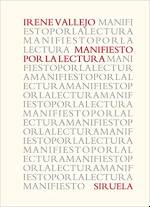 “We are creatures interwoven with stories, embroidered with threads of voices, with history, philosophy, science, laws and legends. Therefore, reading itself will take care of us if we take care of it. What saves us cannot disappear like that. Books remind us of things. They are always serene and ready to unfold before our eyes. The health of words takes root in publishing houses, bookstores, shared reading circles, libraries, and schools. It is there where we imagine the future that unites us all.”
“We are creatures interwoven with stories, embroidered with threads of voices, with history, philosophy, science, laws and legends. Therefore, reading itself will take care of us if we take care of it. What saves us cannot disappear like that. Books remind us of things. They are always serene and ready to unfold before our eyes. The health of words takes root in publishing houses, bookstores, shared reading circles, libraries, and schools. It is there where we imagine the future that unites us all.”
Carlos Vicéns: La dicha de lo inacabado
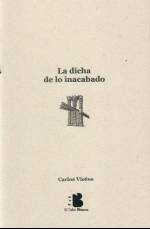 The real overflows every condition, be it human, non-human, or divine, and is confirmed in the infinity that is fulfilled everywhere, moment by moment, without being in its realization an entity, a being, a subject, or a self-contained substance. From this perspective—which is ontological, though not metaphysical—art in general, and poetic writing in particular, is a practice of the infinite. And since there is no way to conceive the infinite without a sense of limitations, in this practice, the edges of an overflow show the necessary return to the contours of the shape. The bliss of the unfinished is a worthwhile reminder of that elemental truth, so ignored for obvious reasons, in this era that basks in the planetary exaltation of its own filth. – Francisco José Ramos
The real overflows every condition, be it human, non-human, or divine, and is confirmed in the infinity that is fulfilled everywhere, moment by moment, without being in its realization an entity, a being, a subject, or a self-contained substance. From this perspective—which is ontological, though not metaphysical—art in general, and poetic writing in particular, is a practice of the infinite. And since there is no way to conceive the infinite without a sense of limitations, in this practice, the edges of an overflow show the necessary return to the contours of the shape. The bliss of the unfinished is a worthwhile reminder of that elemental truth, so ignored for obvious reasons, in this era that basks in the planetary exaltation of its own filth. – Francisco José Ramos
Roberto Arlt: La voluntada tarada, selected by Antonio Díaz Oliva
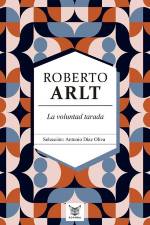 La voluntad tarada is a selection for all readers who haven’t been exposed to the Arltian world. Arlt combines fiction and nonfiction, and sometimes it’s not clear if the narrator is Arlt himself or one of his fictional guises. In general, they can be one in the same. They all share the same furious, urban spirit. (…) It’s a brutal book, yes. But one which, for that very reason, explores violence and clues that can be traced to urban writing today.
La voluntad tarada is a selection for all readers who haven’t been exposed to the Arltian world. Arlt combines fiction and nonfiction, and sometimes it’s not clear if the narrator is Arlt himself or one of his fictional guises. In general, they can be one in the same. They all share the same furious, urban spirit. (…) It’s a brutal book, yes. But one which, for that very reason, explores violence and clues that can be traced to urban writing today.
Roberto Arlt was interested in books, but also in everything that didn’t fit in books. For example, sometimes, this Argentine would look out the window and write: “Each illuminated window in the flood of night is a story yet to be written.” And it might have been this young spirit, the kind of energy he consumed, that eventually killed him. Roberto Emilio Godofredo Arlt was the son of European immigrants, poor newcomers to Argentina at the time. He was born in 1900 in Buenos Aires. Throughout his life, he published four novels, various short story collections, chronicles, and his famous aguafuertes. He also published several stage plays. He traveled to Spain, parts of Africa, Brazil, Uruguay, and Chile. He had two spouses, a son, and a daughter. He died young of a heart attack at the age of 42.
César Vallejo: Fabla salvaje
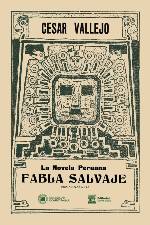 In May 1923, shortly before his final departure to Europe, César Vallejo published Fabla salvaje, his first short novel, in Lima. His work appeared in the collection The Peruvian Novels, edited by Pedro Barrantes Castro. Although the narratives from Escalas, published in March 1923, consisted of Vallejo’s very first prose texts, Fabla salvaje, for many scholars, is the most successful of all his literary works. It should be remembered that a few years before the emergence of this story, Vallejo had already released two of his great poetry collections, Los heraldos negros (1919) and Trilce (1922). Fabla salvaje announces his transition from short, realistic, and modernist narrative to an avant-garde, more liberal and experimental style. The publication of this facsimile edition of Fabla salvaje by Professor César Ferreira of the University of Wisconsin in Milwaukee allows us to appreciate Vallejo’s creative talent as a storyteller.
In May 1923, shortly before his final departure to Europe, César Vallejo published Fabla salvaje, his first short novel, in Lima. His work appeared in the collection The Peruvian Novels, edited by Pedro Barrantes Castro. Although the narratives from Escalas, published in March 1923, consisted of Vallejo’s very first prose texts, Fabla salvaje, for many scholars, is the most successful of all his literary works. It should be remembered that a few years before the emergence of this story, Vallejo had already released two of his great poetry collections, Los heraldos negros (1919) and Trilce (1922). Fabla salvaje announces his transition from short, realistic, and modernist narrative to an avant-garde, more liberal and experimental style. The publication of this facsimile edition of Fabla salvaje by Professor César Ferreira of the University of Wisconsin in Milwaukee allows us to appreciate Vallejo’s creative talent as a storyteller.
José Napoleón Oropeza: El habla secreta: Rostros y perfiles en la poesía venezolana de los siglos XX y XXI (part two)
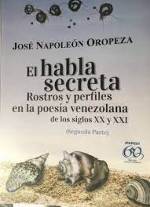 Through the publication of El habla secreta—this being its second part—the title of a collection of five works, writer and university professor José Napoleón Oropeza offers us his critical reading of the poetic universe of renowned Venezuelan poets who, throughout the twentieth and twenty-first centuries, have written important verse collections, outlining an exegetic map of diverse cosmogonical points of view, original in form, in the conception and architecture of many subjects present in each body of work studied.
Through the publication of El habla secreta—this being its second part—the title of a collection of five works, writer and university professor José Napoleón Oropeza offers us his critical reading of the poetic universe of renowned Venezuelan poets who, throughout the twentieth and twenty-first centuries, have written important verse collections, outlining an exegetic map of diverse cosmogonical points of view, original in form, in the conception and architecture of many subjects present in each body of work studied.
This time, the writer tackles—from the perspectives of psycho-critics and semiologists—the formal critical analysis of the works of poets Miguel Ramón Utrera, María Calcaño, Miyó Vestrini, Antonia Palacios, Martha Kornblith, Edda Armas, Belkys Arredondo Olivo, María Clara Salas, and Lazaro Álvarez.
Krina Ber: Ficciones asesinas
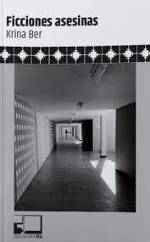 In the fascinating microcosm of a residential complex, where the community’s tensions and secrets take up the neighbors’ everyday lives, a strange relationship is born between Elizabet Rosenberg—former writer and this story’s protagonist—and an Italian ex-detective with a razor-sharp criminal intuition, who suspects hidden connections between a series of apparent accidents. As if this weren’t enough to catch the reader’s interest, this book also paints a picture of a country subjugated by an Orwellian government that uses twisted procedures to keep the population captive in the corrupted space of its national territory. The narration goes back and forth between Elizabet’s diary and a voice narrating the events, but from a perspective that is more prying than omniscient. In this portrait of anecdotal richness, the composition unfolds—with yet another turn of the screw—into a medley of strategies that increase its expressive potency: mechanisms from the detective novel, full of dark humor; certain parodic hints of the romance novel; elements of dystopian narrative and metafictional winks that help blur the lines between fiction and reality. This is a captivating novel in the freshness of its depictions of social circumstances we find close to home, and in the lucidity of its approaches to love and death, the experience of aging, and life itself.
In the fascinating microcosm of a residential complex, where the community’s tensions and secrets take up the neighbors’ everyday lives, a strange relationship is born between Elizabet Rosenberg—former writer and this story’s protagonist—and an Italian ex-detective with a razor-sharp criminal intuition, who suspects hidden connections between a series of apparent accidents. As if this weren’t enough to catch the reader’s interest, this book also paints a picture of a country subjugated by an Orwellian government that uses twisted procedures to keep the population captive in the corrupted space of its national territory. The narration goes back and forth between Elizabet’s diary and a voice narrating the events, but from a perspective that is more prying than omniscient. In this portrait of anecdotal richness, the composition unfolds—with yet another turn of the screw—into a medley of strategies that increase its expressive potency: mechanisms from the detective novel, full of dark humor; certain parodic hints of the romance novel; elements of dystopian narrative and metafictional winks that help blur the lines between fiction and reality. This is a captivating novel in the freshness of its depictions of social circumstances we find close to home, and in the lucidity of its approaches to love and death, the experience of aging, and life itself.
Sonia Chocrón: Hermana pequeña
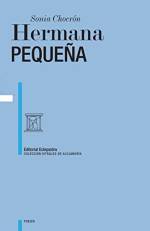 This is “a single poem,” says Sonia Chocrón, and she shows us the stops on a journey. A declaration of principles, she might say, that starts with a quote from the liturgical poem by Rabbi Abraham Hazzan of Gerona (18th c.) that serves as a rubric for this verse collection, before moving on to Idea Vilariño and Alejandra Pizarnik. Three voices and a bridge that nourish her letters: Jewish roots that this poetry holds up on American voices. Hermana pequeña / Ajot Ketaná: thus, in Hebrew, Ladino, and markedly Venezuelan voices, this territory echoes with traditions and lived experiences; with pursuits, moorings, and encounters; with arrivals and goodbyes. Lines that lead to intersections of flights, abandonments, and recoveries through memory, of loving submission to the nearest and dearest, of sensual passage over the body. “To be what one is”: not to insist until it becomes unnecessary to remind those who deny or refuse to hear. “Why do I carry on invoking?” she wonders. And the answer is in that submission. Sonia Chocrón is part of “Generation S”: we are survivors of expulsions, of the Shoah, of hate and misery, of the filth that invades “this territory of evils.” These letters writhe through us, with the balance longed for in the midst of desire, with the need to make berth in the port that is a greeting of peace. There we find Sonia Chocrón: a poet in her home. – Saúl Sosnowski
This is “a single poem,” says Sonia Chocrón, and she shows us the stops on a journey. A declaration of principles, she might say, that starts with a quote from the liturgical poem by Rabbi Abraham Hazzan of Gerona (18th c.) that serves as a rubric for this verse collection, before moving on to Idea Vilariño and Alejandra Pizarnik. Three voices and a bridge that nourish her letters: Jewish roots that this poetry holds up on American voices. Hermana pequeña / Ajot Ketaná: thus, in Hebrew, Ladino, and markedly Venezuelan voices, this territory echoes with traditions and lived experiences; with pursuits, moorings, and encounters; with arrivals and goodbyes. Lines that lead to intersections of flights, abandonments, and recoveries through memory, of loving submission to the nearest and dearest, of sensual passage over the body. “To be what one is”: not to insist until it becomes unnecessary to remind those who deny or refuse to hear. “Why do I carry on invoking?” she wonders. And the answer is in that submission. Sonia Chocrón is part of “Generation S”: we are survivors of expulsions, of the Shoah, of hate and misery, of the filth that invades “this territory of evils.” These letters writhe through us, with the balance longed for in the midst of desire, with the need to make berth in the port that is a greeting of peace. There we find Sonia Chocrón: a poet in her home. – Saúl Sosnowski
Carmen Berenguer: Plaza tomada: Poesía (1983-2020), selection and prologue by Claudia Posadas
 The poetry of Carmen Berenguer is a study in intensities. It takes place within language itself, from which it subtracts these words, this recondite, hurried, and fresh poetry whose immediate truth is imposed upon us like that of a solved puzzle. Her work is the spirited and fertile new beginning of a repeated wager on the greater power of words: the constant remaking of the contracts of communication.
The poetry of Carmen Berenguer is a study in intensities. It takes place within language itself, from which it subtracts these words, this recondite, hurried, and fresh poetry whose immediate truth is imposed upon us like that of a solved puzzle. Her work is the spirited and fertile new beginning of a repeated wager on the greater power of words: the constant remaking of the contracts of communication.
Her writing documents the nomadism of this fin de siècle. She re-inscribes in poetry, in the rituals of her Chilean ceremony, the counter-current of alternate signs, those that leave behind in the street their wounded wanderings, their marker of humanity in doubt. But, instead of elevating a testimony, this writing returns to the witnesses their chance to cross-examine: it places in their hands the word denied them by the sanctioning courts. And so this poetry, while carved as if on stone, is also pronounced like a plea.
In all her Chilean colloquial vivacity and rebelliousness, the worldly heartbeat of Carmen Berenguer finally comes to Mexico. – Julio Ortega
Yanko González: Upper Volta, translated by Stephen Rosenshein
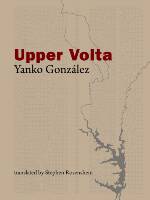 Like an anthropologist doing fieldwork, in Upper Volta Yanko González collects language from street corners, grocery store aisles, cocktail hours, and historical sources, laying data bare with a poet’s meticulous hand. In his findings, González gives voice to the voiceless, and exposes the underbelly of our own biases—the ways in which they manifest in everyday language and collective consciousness. Originally published in Chile in 2007, Upper Volta transcends borders and boundaries in its exploration of topics all too relevant in our current political climate. Like a mirror, it forces us to look head-on at the language of globalization and ethnocentrism and the changing tide of thought and culture within our own society.
Like an anthropologist doing fieldwork, in Upper Volta Yanko González collects language from street corners, grocery store aisles, cocktail hours, and historical sources, laying data bare with a poet’s meticulous hand. In his findings, González gives voice to the voiceless, and exposes the underbelly of our own biases—the ways in which they manifest in everyday language and collective consciousness. Originally published in Chile in 2007, Upper Volta transcends borders and boundaries in its exploration of topics all too relevant in our current political climate. Like a mirror, it forces us to look head-on at the language of globalization and ethnocentrism and the changing tide of thought and culture within our own society.
About the book, JD Pluecker writes: “Upper Volta warns: words might suddenly shift in meaning… with no warning. A colony supposedly shuttered, with an abiding significance. Here are the Germans and the subjunctive, the flags and the Peruvians, the Mapuches and a shopkeeper. Slips of the tongue that reveal the class of the speaker, the caste, the catastrophe of a daily precarious living.”
Ana Teresa Torres and Yolanda Pantin: Viaje al poscomunismo
 Viaje al poscomunismo tells of two Venezuelan writers’ journey, planned and undertaken in six stages between 2002 and 2012, through various parts of Europe, Russia, and Central Asia, all with one thing in common: having existed under a communist regime.
Viaje al poscomunismo tells of two Venezuelan writers’ journey, planned and undertaken in six stages between 2002 and 2012, through various parts of Europe, Russia, and Central Asia, all with one thing in common: having existed under a communist regime.
“We travel without innocence,” say the authors. “We want to come closer to our future, following the tracks left in other places by a communist past. The reasoning behind this effort is none other than the unknown quantity of Venezuela, where a political project was installed under the name of the socialism of the twenty-first century. It was not only an inquiry, as we believed, but also a preparation for the coming of an unthinkable reality, not so much with regards to our country, but because it disrupts the world we once knew.”
Translated by Jenna Tang


